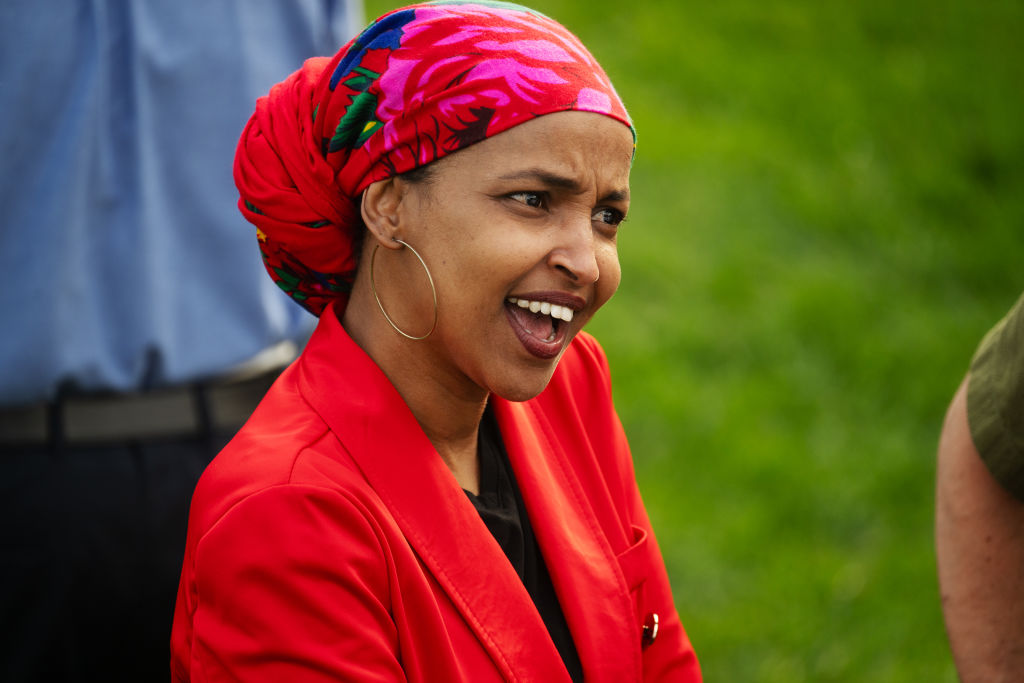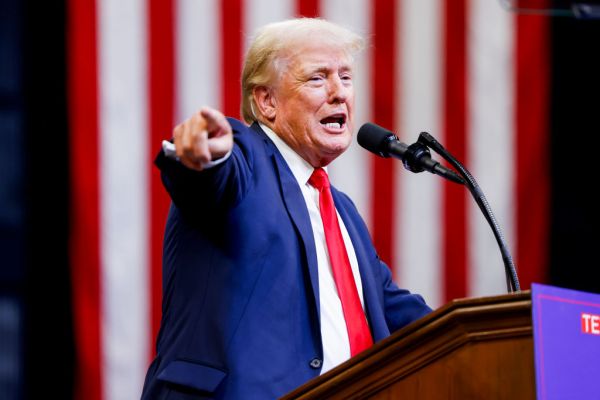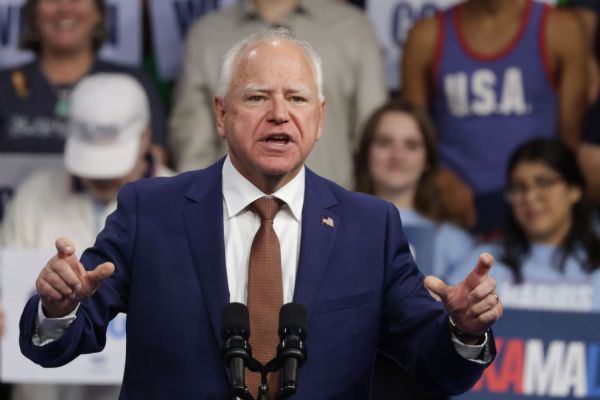Happy Wednesday! Wisconsin Senate candidate Eric Hovde, the newly minted Republican nominee challenging Democratic Sen. Tammy Baldwin, introduced “Tammy the ‘Do Nothing’ Duck,” urging Baldwin to stop “ducking debates, reporters, voters and the tough questions.” The mascot must have the incumbent quacking in her boots. (Editor’s note: Boo!)
Up to Speed
- Vice President Kamala Harris will hold a campaign event in North Carolina on Thursday to outline “her plan to lower costs for middle-class families and take on corporate price-gouging,” The Hill reported Tuesday. Harris had planned to hit the Southern battleground state last week during her blitz after announcing Minnesota Gov. Tim Walz as her running mate, but Tropical Storm Debby forced the campaign to delay that visit, as well as a planned stop in Savannah, Georgia.
- A federal judge ruled Tuesday that independent presidential candidate Cornel West will appear on North Carolina’s ballot, overturning the decision of the state elections board. The left-wing academic could draw progressive votes away from Harris and help former President Donald Trump, although he is not registering much support in recent polling. Trump won the state in 2020 by about 1.5 percentage points, and even some polls without West consistently show the Republican nominee beating Harris there.
- But fresh polling conducted for the nonpartisan Cook Political Report with Amy Walter saw Harris beating Trump in head-to-head matchups and in contests with third-party candidates in Arizona, Michigan, North Carolina, Pennsylvania, and Wisconsin. Harris and Trump were tied in Georgia, and the former president led the vice president in Nevada. The last Cook poll in May had Trump leading Biden in every state by substantial margins. The good news for the Republican nominee in the new surveys is that he led Harris on the question of who would do a better job managing key issues, such as immigration (plus-14), inflation (plus-6), and crime (plus-4.)
- The Harris campaign announced Wednesday a $90 million advertising buy to air during the final three weeks of August across key battleground states. The ads are set to run on television, radio and digital platforms, with the TV spots micro-targeted to key demographic groups, airing during programs such as The Bachelorette, Big Brother, The Daily Show, Love & Hip Hop: Atlanta, and The Simpsons.
- Walz made his first solo campaign stop Tuesday evening at the international convention of the American Federation of State, County and Municipal Employees in Los Angeles. He responded to GOP attacks on the timing of his retirement from the military. “These guys are even attacking me for my record of service and I just want to say I’m proud to have served my country and I always will be,” Walz said. Afterwards, the Democratic vice presidential nominee was scheduled to kick off a five-event, cross-country fundraising tour that was to start in Southern California and take him to Colorado, Massachusetts, Rhode Island, and New York.
- Meanwhile, Walz’s Republican counterpart, Sen. J.D. Vance of Ohio, is scheduled to host a campaign event at a Veterans of Foreign Wars post in Pennsylvania on Thursday morning. Republican Reps. Jim Banks of Indiana, and Brian Mast and Michael Waltz, both of Florida, are set to join him. Like Vance, all three are war veterans.
- Trump on Monday evening sat down for an X ‘Space' conversation with billionaire Elon Musk, the eccentric owner of the social media platform. The pair covered issues ranging from border security to climate change to the criminal cases against Trump in the two-hour-long conversation, which began 40 minutes after it was scheduled due to what Musk claimed was a cyber attack. The conversation came after Musk endorsed Trump and after the former president gave an interview to controversial livestreamer Adin Ross and Vance appeared on the Nelk Boys’ Full Send Podcast, both of which appeal to younger male audiences.
- Former Republican presidential candidate Nikki Haley unloaded on Trump during an interview on Tuesday’s edition of Fox News’ Special Report with Bret Baier, saying that the GOP nominee needs to change course if he wants to defeat Harris. “Quit whining,” said Haley, the runner-up for the Republican presidential nomination. “This is not an election for just the MAGA vote. Trust me, Donald Trump has that. Republicans need to be fighting for suburban women, for college educated [voters,] for independents, for moderate Republicans and conservative Democrats … I want this campaign to win. But the campaign is not going to win talking about crowd sizes. It’s not going to win talking about what race Kamala Harris is.”
Rep. Ilhan Omar Easily Survives a Primary Challenge

Major pro-Israel challengers of the group of progressive lawmakers known as the “Squad” received their first loss of the election cycle Tuesday.
Rep. Ilhan Omar of Minnesota defeated Don Samuels in the Democratic primary by more than 13 points, likely securing a fourth term in the deep-blue Minneapolis-based congressional district.
Observers had paid close attention to that race for two reasons. The first was the success of pro-Israel Democrats against Reps. Jamaal Bowman of New York and Cori Bush of Missouri earlier this summer. The second was that Samuels finished about 2 percentage points, or 2,500 votes, away from unseating Omar in 2022.
One conspicuously absent factor in Tuesday’s race was the massive spending by pro-Israel groups, such as United Democracy Project—the super PAC affiliated with the American Israel Pubic Affairs Committee (AIPAC)—which spent $350,000 to help Samuels last cycle. Funds from such groups helped make Bowman and Bush’s House primaries this year the two most expensive in history. But despite progressive complaints, the pro-Israel money doesn’t tell the whole story of those two defeats. Bowman had put up lackluster polling numbers before AIPAC’s ad blitz began, and in moving to the left on Israel he had alienated liberal pro-Israel groups that had previously backed him. In Bush’s race, some polling showed her comfortably leading challenger Wesley Bell before AIPAC spent significant money, while at least one poll showed Bell up by double digits before the spending began.
Still, in an interview with Jewish Insider last month, Samuels called on pro-Israel groups to get involved in his race.
A piece from the Jewish Telegraphic Agency last week pointed to several factors that AIPAC and other groups stayed out of the primary this year. The first was polling. Both Omar’s and Samuels’ campaign polling had the incumbent beating her challenger by double digits in the months leading up to the election. The second was fundraising. Omar had raised more than $6.8 million this cycle and spent more than $6.3 million of it as of late July. Samuels had brought in more than $1.4 million and utilized around $1.2 million. Finally, Samuels in 2022 could tie Omar to calls for unpopular progressive police reforms in the wake of the riots that heavily affected Minneapolis after the death of George Floyd in 2020. Those issues had faded by this election cycle.
Elsewhere in the Midwest, Wisconsin voters in both parties made their nominees for the marquee Senate race official, sending incumbent Democratic Sen. Tammy Baldwin and Republican challenger Eric Hovde to the general election.
There was a little more drama in its House primaries. Business owner Rebecca Cooke defeated state Rep. Katrina Shankland by nearly 9 points in the Democratic primary to take on Republican Rep. Derrick Van Orden, who flipped the western Wisconsin district for the GOP in 2022. Cooke had positioned herself as the moderate in the primary compared to Shankland, receiving the endorsement of the Blue Dog Coalition.
In the GOP primary in a comfortably red district centered on Green Bay, which Mike Gallagher represented until he resigned earlier this year, Tony Wied, the founder of a convenience store chain, defeated by more than 7 points Roger Roth, a veteran who lost in 2022 as the Republican nominee for lieutenant governor. Wied’s endorsement from former President Donald Trump beat out Roth’s endorsements from former Gov. Scott Walker, former Secretary of State Mike Pompeo, and Rep. Scott Fitzgerald. Wied made his Trump endorsement a centerpiece of his campaign. Every campaign press release since late July has described him as “Trump-endorsed conservative Tony Wied,” and he cut two ads touting the former president’s backing against “RINO Roger Roth.”
Are Presidential Campaigns Prepared to Fend Off Foreign Hackers?

Hostile foreign powers are attempting to infiltrate American presidential campaigns via the preferred mode of modern-day espionage: hacking. But it’s unclear how those campaigns are prepared to handle the disruption that foreign influence could have during the final months before the election.
The Washington Post reported this week that the FBI is investigating a possible hacking scheme backed by Iran that has targeted both of the leading presidential campaigns. Donald Trump’s campaign, in fact, had over the weekend claimed to be the victim of a hack that Microsoft had reported Friday after multiple news outlets, including Politico, received internal campaign documents from a source and asked Trump’s team about them. CNN reported that the FBI has informed veteran GOP operative and Trump associate Roger Stone his email account was compromised.
Additionally, the Iranian hack, which Microsoft says involved a group connected with the Iranian Revolutionary Guard Corps, appears to have also targeted Joe Biden’s campaign before the Democratic president withdrew from the race.
“Three staffers on the Biden-Harris campaign received spear phishing emails that were designed to appear legitimate but could give an intruder access to the recipients’ communications, according to people familiar with the matter who spoke on the condition of anonymity to describe a sensitive investigation,” the Post reported. “So far, investigators have not found evidence that those hacking attempts were successful, these people said.”
The FBI investigation underscores the threat both major-party candidates face from a direct cyberattack or hacking, with Iran now joining previously identified efforts by Russia and China to interfere in political activity in the U.S. in the final months before the election. None of the news outlets have published the contents of the hacked Trump campaign documents, though they have described them as research documents on Trump’s running mate, Sen. J.D. Vance, and another potential vice-presidential pick, Sen. Marco Rubio.
When asked by Dispatch Politics about how the campaigns intend to avoid future hacking attempts or handle a situation where their opponents were hacked, both the Trump and Harris teams were reticent.
“Our campaign vigilantly monitors and protects against cyber threats, and we are not aware of any security breaches of our systems,” said a Harris official after the campaign declined to answer other questions.
Meanwhile Steven Cheung, a Trump campaign spokesman, replied to a series of similar questions from Dispatch Politics with a simple statement: “We do not discuss internal security measures on the campaign.”
Campaign operatives at the highest level have been aware of the threat from hacks, whether from foreign actors or domestic, for years. In 2017, as part of the Harvard Kennedy School’s Defending Digital Democracy project, the former campaign managers for Hillary Clinton and Mitt Romney co-authored the “Cybersecurity Campaign Playbook” with former top Pentagon official Eric Rosenbach.
“Our increasingly digital way of living and working offers new ways for adversaries to influence our campaigns and elections,” wrote Robby Mook, who led Clinton’s 2016 campaign, and Matt Rhoades, who led Romney’s in 2012, in the introduction to the playbook. “While you don’t need to be a cyber expert to run a successful campaign, you do have a responsibility to protect your candidate and organization from adversaries in the digital space.”
The playbook itself looks familiar to anyone who has taken a corporate cybersecurity training course. The authors urge campaigns to use protective measures like two-factor authentication, password managers, and encrypted messaging to protect sensitive documents and communication from either internal or external leakers. There are also guidelines for how to respond to breaches, from creating an in-house response team and chain of command for immediately protecting the rest of the campaign to informing law enforcement.
But nearly eight years after the publication of the playbook, these and other lessons are hardly protective enough. The Trump campaign breach appears to have failed on several counts, including limiting internal access to sensitive information (Stone has no formal role with the campaign) and communicating with law enforcement.
“When the Trump campaign initially concluded it had been hacked, it did not alert the FBI, according to campaign advisers,” the Post reported Monday. “The decision not to alert the FBI was made partially because of the campaign’s distrust of the agency, the people said.”
Notable and Quotable
“Illegal immigration saved my life.”
—Former President Donald Trump in his X interview with Elon Musk, noting that he turned his head to look at a chart of immigration statistics at just the right moment to avoid a potentially lethal bullet wound, August 12, 2024








Please note that we at The Dispatch hold ourselves, our work, and our commenters to a higher standard than other places on the internet. We welcome comments that foster genuine debate or discussion—including comments critical of us or our work—but responses that include ad hominem attacks on fellow Dispatch members or are intended to stoke fear and anger may be moderated.
With your membership, you only have the ability to comment on The Morning Dispatch articles. Consider upgrading to join the conversation everywhere.